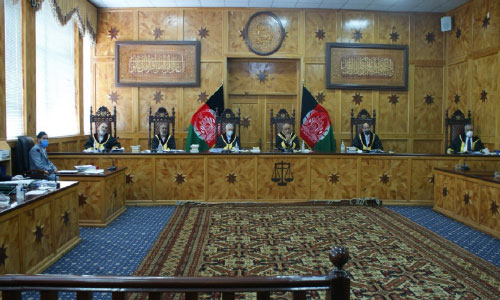KABUL - The Supreme Court of Afghanistan has been the "most closed government institution for the past two years," and no information is available on its functions and especially its handling of large-scale corruption cases, officials from the Access to Information Commission said on Thursday.
The commission said the existence of corruption and the inability of the institution have prevented the top legal body from sharing information with the Afghan people and media.
Along with the Supreme Court, the Attorney General’s Office is also one of the main institutions which appear unwilling to provide information on the progress of corruption cases of cabinet ministers and other top government officials.
Six years ago, Sayed Yousuf Halim took the oath of office as the Chief Justice of Afghanistan.
Abdul Malik Kamawi, Barat Ali Matin, Abdul Qader Adalatkhaw, Abdul Haseeb Ahadi and Mohammad Zaman Sangari, Anisa Rasuli, Abdullah Attayee and Abdul Shokor Mahjoor, are the members of the High Council of the Supreme Court.
“The Supreme Court--out of all the legal and judicial institutions-- is the most closed institution when it comes to access to information, they must set an example because their area of work is the law and access to information is a human right,” said Hamdullah Arbab, a member of the Access to Information Commission.
“I don’t know where the Supreme Court is, where the chief justice is, what are they doing?" asked Abdul Rahim, a resident in Kabul.
“If they can’t serve, then what is the importance of their presence,” said Mohammad Yasin, a resident in Kabul.
“Last year, the senate referred Humayoun Qayoumi (former acting minister of finance) to the legal and judicial institutions for being involved in corruption, but they couldn't manage to bring him to justice,” said Mohammad Faisal Sami, the first deputy head of the Afghan senate.
Previously, the Ministry of Interior said that out of a total of 6,000 people for whom arrest warrants had been issued by the court, 2,800 cases had been investigated over the past three years. However, it is not clear about which people--of what rank--were among those arrested. (TOLO NEWS)
Home » Afghanistan » Afghan Supreme Court Called Out for Lack of Transparency
Afghan Supreme Court Called Out for Lack of Transparency

